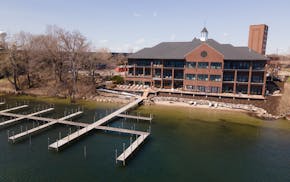More than six years after the case began, the judge overseeing the corporate bankruptcy of Ponzi master Tom Petters said it is time to start bringing the matter to a conclusion.
Chief U.S. Bankruptcy Judge Gregory Kishel on Tuesday told attorneys for creditors and for trustee Doug Kelley that they need to develop a plan for resolving legal and logistical issues in a bankruptcy that has no immediate end in sight.
"It's appropriate at this point to start getting some structure on that process and start setting some sort of timetable to try and get issues resolved," Kishel told a courtroom of 25 lawyers.
Acknowledging that the case has been "law-heavy and accounting-heavy," Kishel said it was only a matter of time before creditors got antsy about seeing some payouts.
"I can't really fault the trustee for not having filed a plan to date. There's been a lot else going on in these cases," Kishel said. But he added: "There needs to be a timetable for resolution."
That said, however, it could be several years before the bankruptcy closes.
Kelley has more than 100 lawsuits filed against lenders seeking to recover, or claw back, so-called false profits. In those cases, Kelley needs to show that there were warning signs that should have alerted lenders that the Petters' operation was a source of fraud.
Kelley also has more than $2 billion in disputed claims from hedge funds and other investors who did business with Petters before the $3.65 billion Ponzi scheme collapsed.
"I'm pleased to put a date on a plan and have the court help supervise it," said Kelley, who noted in an interview that he has been meeting privately with the largest disputed creditors to find a middle ground. "If the judge will help me expedite things, it's going to be much better."
The Petters operation lasted more than a decade and lured lenders with the promise of good returns from the sale of consumer electronic items to big-box retailers. But in reality, funds from new lenders paid off old investors until the whole operation crashed in 2008.
Kishel's remarks Tuesday came at the end of a morning hearing about a request by a small group of lenders to withhold some of the fees being paid to the Minneapolis law firm of Lindquist and Vennum and to the accounting firm PricewaterhouseCoopers, both of which were retained by Kelley in the early days of the 2008 bankruptcy.
The group said withholding of fees would provide an incentive for the professional staff and the trustee to develop a plan for distributing proceeds in the bankruptcy.
"We're standing here today 6 ½ years later, and the estate is holding nearly $160 million. The professionals have been paid $50 million in fees, and the creditors have not been paid anything," said Benjamin Finestone, a lawyer representing creditor Greenpond South.
"This is not an attack on the job the professionals have done, but the goal of Chapter 11 bankruptcy is to secure a plan to get money out to creditors," Finestone added. "We're at a loss for what to do."
But Kelley's attorney, James Lodoen, said with all the claim disputes at the moment, it would be impossible to develop a distribution plan that would win approval from creditors.
"The trustee would be the first to acknowledge that these cases are expensive and take a long time," Lodoen told Kishel. "This bankruptcy has been fraught with litigation every step of the way."
Lodoen said the trustee's goal is to "bring maximum recovery to the estate as soon as reasonably possible."
Kishel, who denied the motion to withhold professional fees, told the attorneys for both sides to start developing "a platform" for a bankruptcy plan starting with their next hearing in April.
"This was the third-largest Ponzi scheme in American history. There was nothing left when it collapsed. We knew it was going to be protracted and complicated," Kishel said.
David Phelps • 612-673-7269

Thief River Falls' Arctic Cat sold to group that includes former executive

First hotel built on Lake Minnetonka in a century opens May 1
University of Minnesota's Osterholm spearheads effort to restore vaccine confidence

Competition for Twin Cities homes between $250K and $500K is fiercer than ever
